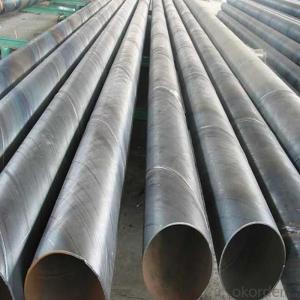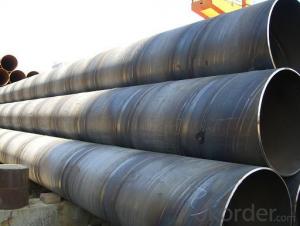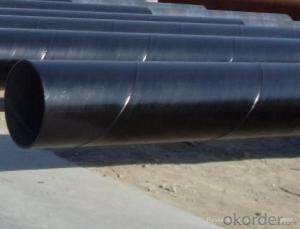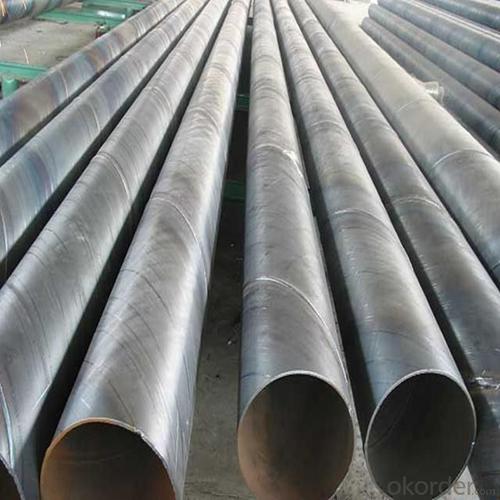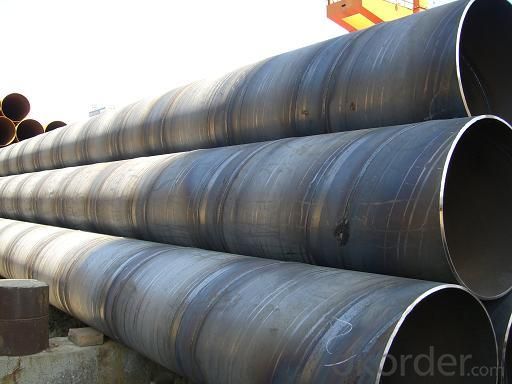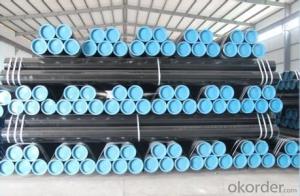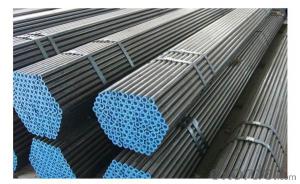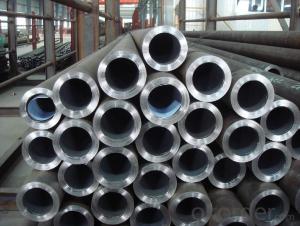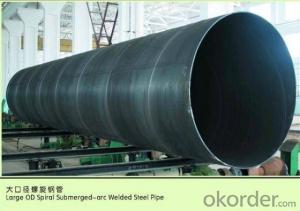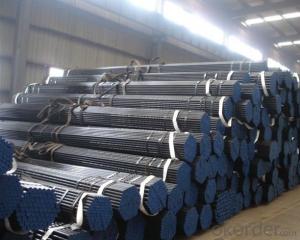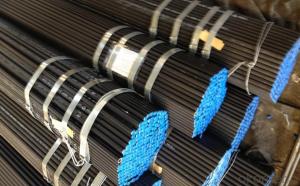SPIRAL CARBON STEEL PIPE ASTM A53/ASTM A106
- Loading Port:
- China Main Port
- Payment Terms:
- TT OR LC
- Min Order Qty:
- -
- Supply Capability:
- -
OKorder Service Pledge
OKorder Financial Service
You Might Also Like
Packaging & Delivery
Packaging Detail: | standard export packing or as customer's requirement |
Delivery Detail: | within 10 - 30 days |
Specifications
Spiral Welded Steel Pipes and Tubes
1.Material:Q195-Q235
2.Length:1-12m
3.WT:1.0-14mm
4.O.D.:20-273mm
Spiral Welded Steel Pipes and Tubes
Product Description:
1.Material : Q235,Q345,L245,L290,L360,L415,L450,L485,GrB,X42,46,X52,X56,X60,X65,X70,X80,X100
2,Standard: SY/T5037-2000,GB/T9711-2011,API Spec 5L PSL1/PSL2,ASTM A252\A53,ISO3183,DIN17172,EN10217,JIS G3457,AWWA C200,ASTM A139,ASTM A671,ASTM A672
3.Wall thickness: 3.0mm-30mm
4.Outer diameter: φ168mm-3020mm
5,Length: 5m-12m or as your requirement
6,Corrosion protection standard: DIN30670,DIN30671, AWWAC210, AWWA C203, SY/T0413-2002,SY/T0414-2002
7,Application: Oil, gas, natural gas, water pipe, thermal electricity pipe, steel structure engineering, etc
Q195-q345 Material Steel Pipe's Materials
Elements | Chemical Compsition% | Mechanical Property | ||||||
| C% | Mn% | S% | P% | Si% | Yield Point (Mpa) | Tensile Strength(Mpa) | Elongation |
Q195 | 0.06-0.12 | 0.25-0.50 | <0.050 | <0.045 | <0.030 | >195 | 315-430 | 32-33 |
Q215 | 0.09-0.15 | 0.25-0.55 | <0.05 | <0.045 | <0.030 | >215 | 335-450 | 26-31 |
Q235 | 0.12-0.20 | 0.30-0.70 | <0.045 | <0.045 | <0.030 | >235 | 375-500 | 24-26 |
Q345 | <0.20 | 1.0-1.6 | <0.040 | <0.040 | <0.55 | >345 | 470-630 | 21-22 |
- Q: What is the difference between steel pipes and copper-nickel pipes?
- Steel pipes and copper-nickel pipes differ in terms of their composition and properties. While steel pipes are primarily made of steel, copper-nickel pipes are composed of a mixture of copper and nickel. This difference in composition leads to variations in their strength, corrosion resistance, and thermal conductivity. Steel pipes are generally stronger and more durable, making them suitable for high-pressure and heavy-duty applications. On the other hand, copper-nickel pipes have excellent corrosion resistance, particularly in marine environments, and exhibit good thermal conductivity, making them ideal for heat transfer applications. Ultimately, the choice between steel pipes and copper-nickel pipes depends on the specific requirements and conditions of the intended use.
- Q: How many fasteners are there in a ton of steel tubes?
- Steel tube (Steel pipe) production technology development began in the bicycle manufacturing industry, the rise of the early nineteenth Century during the oil development, the two world war ships, boilers, aircraft manufacturing, manufacturing of power boiler after the Second World War, the development of chemical industry of petroleum and natural gas drilling and transportation, will effectively promote the the yield and quality of varieties, the development of steel tube industry.
- Q: How are steel pipes used in the manufacturing of automotive exhaust systems?
- Steel pipes are used in the manufacturing of automotive exhaust systems as they provide durability, strength, and corrosion resistance required to withstand high temperatures and harsh conditions. These pipes are used to transport exhaust gases from the engine to the rear of the vehicle, ensuring efficient emission control and noise reduction.
- Q: Can steel pipes be insulated for thermal efficiency?
- Steel pipes can indeed be insulated to enhance their thermal efficiency. By insulating steel pipes, heat loss or gain can be minimized, depending on the specific purpose. Typically, the insulation material is wrapped around the pipes, creating a protective barrier. This barrier effectively prevents heat transfer between the pipes and the surrounding environment. As a result, the energy required to heat or cool the fluid flowing through the pipes is significantly reduced, leading to improved energy efficiency. This practice is widely employed in industries such as HVAC, oil and gas, and industrial processes, where precise temperature control is crucial. Moreover, insulation also serves to prevent condensation and corrosion on the outer surface of the pipes. All in all, insulating steel pipes is a cost-effective measure that enhances thermal efficiency and reduces energy consumption.
- Q: How are steel pipes tested for quality assurance?
- Steel pipes are tested for quality assurance through various methods such as hydrostatic testing, non-destructive testing (NDT) techniques like ultrasonic testing, magnetic particle testing, and visual inspection. These tests ensure that the pipes meet the required standards and specifications, checking for flaws, defects, and proper dimensional accuracy.
- Q: What is the difference between steel pipes and HDPE pipes?
- Steel pipes are made of steel, which is a sturdy and durable material. They are commonly used in industrial applications and can withstand high pressure and extreme temperatures. HDPE pipes, on the other hand, are made of high-density polyethylene, a type of plastic known for its flexibility and corrosion resistance. They are commonly used in water supply systems and underground applications. The main differences between steel pipes and HDPE pipes lie in their material composition, properties, and applications.
- Q: What is the buckling type thin-wall steel pipe? What is a tight set of thin-walled steel tubes? What's the difference between the two?
- The nut body and the junction box are connected at one end by adopting metric fine tooth thread, and the pipe is connected with the pipe, and one end is the same as the straight pipe joint (direct). Withhold the box joint points inside and outside teeth two. The diameter of straight pipe joint is divided into 16mm, 20mm, 25mm, 32mm, 40mm, 50mm.
- Q: What are the safety considerations while handling steel pipes?
- When handling steel pipes, some key safety considerations include wearing appropriate personal protective equipment (PPE) such as gloves, safety glasses, and steel-toe boots to protect against potential injuries. It is important to be cautious of the weight and size of the pipes, using proper lifting techniques and equipment to prevent strains or accidents. Additionally, workers should be mindful of the sharp edges and potential for cuts or punctures, ensuring they have a clear and organized workspace to minimize the risk of tripping or falling. Regular inspections of the pipes for any damages or defects are also crucial to prevent accidents and maintain a safe working environment.
- Q: How do you calculate the pipe thermal expansion coefficient for steel pipes?
- To calculate the pipe thermal expansion coefficient for steel pipes, you need to consider the material's linear expansion coefficient and the change in temperature. The linear expansion coefficient for steel is typically around 12 x 10^-6 per degree Celsius. First, determine the initial length of the pipe, which is denoted as L0. Then, measure the change in temperature, denoted as ΔT. Next, multiply the initial length of the pipe by the linear expansion coefficient and the change in temperature: ΔL = L0 * α * ΔT. The resulting value, ΔL, represents the change in length of the steel pipe due to thermal expansion.
- Q: What are the different methods of joining steel pipes for oil and gas pipelines?
- There are several methods of joining steel pipes for oil and gas pipelines, including welding, threading, and flange connections. Welding involves heating the ends of the pipes and fusing them together, creating a strong and seamless joint. Threading, on the other hand, involves cutting threads on the pipe ends and using threaded fittings to connect them. Flange connections use flanges and bolts to join the pipes together, allowing for easy disassembly and maintenance. Each method has its advantages and is chosen based on factors such as pipeline design, specifications, and project requirements.
Send your message to us
SPIRAL CARBON STEEL PIPE ASTM A53/ASTM A106
- Loading Port:
- China Main Port
- Payment Terms:
- TT OR LC
- Min Order Qty:
- -
- Supply Capability:
- -
OKorder Service Pledge
OKorder Financial Service
Similar products
Hot products
Hot Searches
Related keywords
